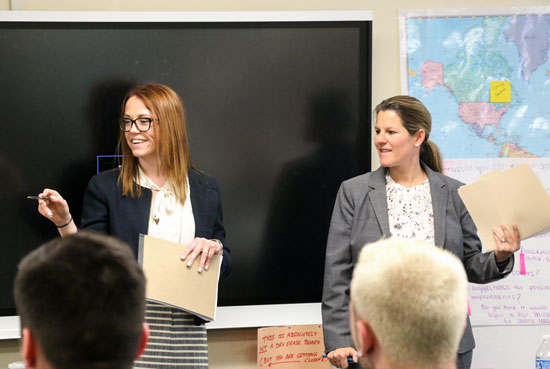
Law Day in the Schools Challenges Teens to Think Outside the Box

Allison Belanger and Jill Brenner Meixel (Krokidas & Bluestein) speak to William J. Ostiguy High School students.
May 10, 2018– When Krokidas & Bluestein attorneys Jill Brenner Meixel and Allison Belanger began to explain a mock city council exercise to a class of students at William J. Ostiguy High School in Boston, some students were skeptical. They were split into groups and asked to argue either in favor of or against a made-up ordinance that would require teenagers under the age of 17 to remain inside after a 9 p.m. curfew.
Some asked if this would ever really be considered by the Boston City Council. Some commented that since most students in the room were over 16, they wouldn’t be impacted, so they wouldn’t care. Yet all of the students tasked with arguing in favor of the fictitious proposal protested that they didn’t want to pretend to support an unfair rule.
“It’s an exercise, so just like lawyers, you might have to put your personal feelings aside and concentrate on presenting a compelling argument,” Belanger said.
But in fact, the day’s real lesson was to teach students how to empower themselves to express their personal opinions to effect change. The mock city council hearing was part of this year’s Law Day in the Schools Program, and the theme is “Liberty Under Law: Empowering Youth, Assuring Democracy.”
While brainstorming the points they would make in support of their given position, the students became increasingly engaged with the topic they originally were reluctant to address. Some students even observed that it was actually easier to craft arguments around the side they felt less passionately about, since they could easily imagine what problems adults might have with teenagers on the streets at night.
Articulating why they, as teenagers, deserved freedoms was harder. After speaking to Meixel and Belanger, one group struggling with the concept decided to frame their argument around the unfairness of restricting one population of people, but not others.
The idea of the exercise was to introduce the students to a forum where their ideas would be heard. Although the ordinance was not real, the format of the mock hearing was similar to real sessions at City Hall. Students assigned the role of mock city councilors had to weigh the arguments they heard and cast a vote.
The Law Day in the Schools program has a different focus every year, which lawyers go into classrooms to present to students. The lessons often involve a hands-on activity, and the program also provides an opportunity for students to interact with someone in the legal profession and ask them questions about what they do.
Meixel and Belanger teamed up for the second year in a row. In 2017, they were in an elementary school classroom, and both attorneys said it was fascinating to spend time with both groups of students and see the different ways they learn.
“These students are almost at an age where they will be able to vote in elections, which will allow their voices to have even more impact. However, regardless of whether they are of voting age, they should feel empowered to speak up and speak out about issues for which they are passionate, because they can make a difference,” Meixel added.
“If they take anything away, I hope it’s that there is somewhere they can go where someone will listen to them,” Belanger said. “I think we wanted to express to them that there is almost always an appropriate forum for them to voice their opinion and address changes they’d like to see, whether it’s the principal’s office, a local official, or someone in government at the state or national level.”

About Krokidas & Bluestein
Krokidas & Bluestein provides legal services in the areas of nonprofit corporate and tax and for-profit corporate law, health and human services law, real estate development and finance, property management, civil litigation, labor and employment law, and education law.








